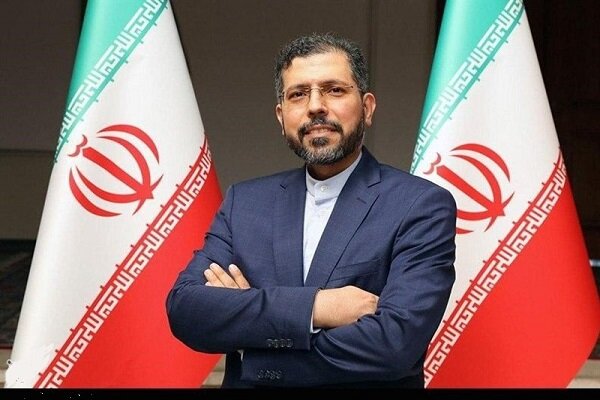World’s response to U.S. was a "big No": Foreign Ministry spokesman
Khatibzadeh says “America has become a nervous, psychotic state”

TEHRAN – Iranian Foreign Ministry spokesman Saeed Khatibzadeh says the international community said a “big No” to attempts by the United States to unilaterally reimpose sanctions on Iran under the name of the United Nations.
Pointing to the UN secretary-general’s remark over claims by Washington that it has activated the so-called “trigger mechanism”, Khatibzadeh told the Tehran Times that “this was another ‘big No’ to the United States.”
“It is clear that the international community's response to the United States was a ‘big No,’” he noted.
Following is the text of the interview:
Q: How do you assess the statement of Antonio Guterres, the UN secretary-general, over legal uncertainty surrounding the U.S. claim to reimpose sanctions in the name of the United Nations?
A: It is clear that the international community's response to the United States was a "big No." The secretary-general of the United Nations stated it exactly in a legal language what the others said before that. As stated in all comments after his remark, this was another "big No" to the United States.
That is why the secretary-general and the Secretariat will not take any further action.
Q: What is the practical impact of the U.S. unilateral action in activating what it calls "snap-back or trigger mechanism"?
A: Two issues need to be highlighted: first it is whether there is basically something called a "snap-back or trigger mechanism". We do not have such jargon in Resolution 2231 of the United Nations Security Council nor in the Joint Comprehensive Plan of Action. In fact, this term is a forgery, and Americans have used it many times to achieve their own goals. What is stated in the resolution and in the JCPOA is the "dispute resolution mechanism."
The second point is that since the U.S. withdrawal from the nuclear deal and ceasing its participation, the United States has waged a campaign of “maximum pressure" against Iran, in which it did everything it could to undermine Iran's abilities and impose all the possible unilateral sanctions against Iran. So, the fuss you see today is a fuss about nothing. They know well that this internal hubbub aims to help Trump inside the country and is related to the upcoming elections in the United States.
On the other hand, they want to intensify the psychological war they have started against the great Iranian nation through this campaign.
However, they know that it has no effect both legally and also in terms of the United Nation’s internal procedures. Nevertheless, commotions created by Pompeo and Trump and their threat that they will punish the entire world show that they know that their actions are legally ineffective and how null and void is their demand.
Q: How do you evaluate the stance of European countries in this regard? Despite the statements issued by E3 (Germany, the United Kingdom, and France) so far, we have not seen any practical steps against the United States.
A: We must differentiate between two issues: First, in the UNSC, Europe and all the permanent and non-permanent members of the Security Council have explicitly and decisively stated that the US has no legal standing, which is a "big No" to the United States. This process has led to Washington's isolation.
So, they have been until now committed. This is related to Resolution 2231 and the U.S. unilateral action to restore the previous Security Council resolutions against Iran, which have been all lifted, while all European and non-European countries in the Security Council have stated that the United States has no legal standing to do so.
But in the case of the JCPOA, as we have said many times one the main benefits Iran was expected to get out of the nuclear deal was sanction lifting, which has not been achieved because of the European governments' failures to honor their words and fulfill their commitments, especially over the past two years, after the U.S. government ceased its participation in the JCPOA.
They have not been able to fulfill even their smallest obligations. Just look at the INSTEX. As it is clear, a simple and trivial issue like INSTEX was implemented at a worthless level after working on it for more than two years.
Therefore, regarding the lifting of sanctions, Europe, and other partners to the JCPOA failed to fulfill their obligations.
Exactly that was why Iran decided to reduce its commitments within the JCPOA framework.
However, the Islamic Republic of Iran has repeatedly stated that if the remaining participants in the JCPOA fulfill their commitments completely, Iran's measures in reducing its commitment according to the JCPOA (five steps to reduce obligations) are completely reversible.
Q: Don’t you think that this claim by the U.S. that it has the right to reimpose sweeping UN-mandated sanctions on Iran will put it in a collision course with the UN Security Council?
A: The United States has withdrawn from many of the international deals it has signed, which shows that the White House no longer tolerate multilateralism. The U.S. government is isolating itself with a very steep slope and at a very high speed under the motto of "America first", which soon turned into “America only". This slogan has led to widespread isolation for the United States. I think if it were possible, Washington would have left even the Security Council. The action taken by the United States on Saturday, September 20, to undermine the Security Council and the United Nations showed that the United States does not have a proper understanding of international relations.
America has become a nervous, psychotic state. These factors have made the U.S. behave like an impulsive state, which makes irrational decisions. Certainly, these decisions by the United States have put the Security Council and the United Nations in limbo, which is not of course in the best interest of the international community.
Leave a Comment